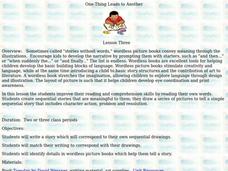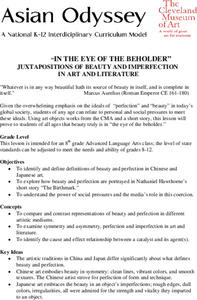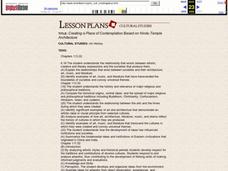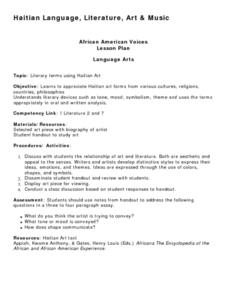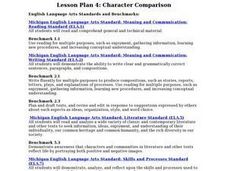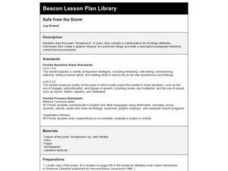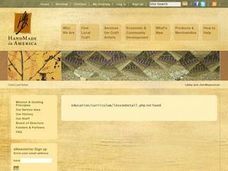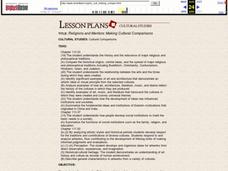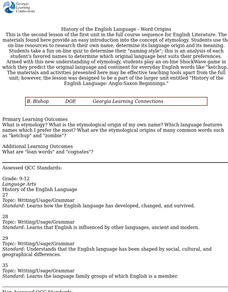Curated OER
Using Effective, Amusing Writing As a Model
Learners use the author's writing as a model to achieve vivid description and engaging humor in compositions of their own. They examine the ways a writer can capture and hold a reader's attention and write a short personal narrative...
Curated OER
Discussion Questions for Amber Bechtel's Essay on AIDS in South Africa
Pupils read an essay by Amber Bechtel on the situation of AIDS in South Africa. After reading, they participate in a class discussion answering questions posed by their teacher. To end the lesson plan, they reflect on the situation in...
Curated OER
One Thing Leads to Another
Students analyze the storytelling methods in wordless books. In this visual storytelling lesson, students write a story that correspond to a specific wordless picture book. Students create their own wordless picture book...
Curated OER
China: How to Put Some "Tang" in Your Medieval Dynasties
Fourth graders label the countries that border China and the physical features of Asia. They discuss the physical features of Asia and label them on the other map.
Curated OER
The Black Plague
Pupils participate in a simulation game to experience the societal effects of the Black Plague during the Medieval Period. Information garnered during the game is used to discuss the current state of communicable diseases in our
world...
Curated OER
INDUSTRY AND THE ENVIRONMENT
Seventh graders create a final project called Industry X (which was previously researched in the unit) has plans to build in town. There is a special town meeting scheduled to discuss this matter and allow everyone to express their...
Curated OER
In The Eye Of The Beholder
Students identify and define definitions of beauty and perfection in Chinese and
Japanese art and compare those definitions to other cultural beliefs and societies. This lesson includes a two-part lesson evaluation.
Curated OER
Voyages of Discovery
Students create individual "travel logs" for a world explorer whom they studied in history class. This lesson plan is an interdisciplinary activity for the Language Arts and History classroom.
Curated OER
Creating a Place of Contemplation Based on Hindu Temple Architecture
Students study the architecture and decoration of Hindu temples, compare them with, and apply them to, a place of contemplation they will design for themselves.
Curated OER
The Role of the Teacher
Students study the role of the teacher in various cultures and societies through in-class discussions, literature investigations, and personal reflection. Lesson extensions include a "Living Portraits" activity and a "Student becomes the...
Curated OER
Searching for Me in You
Pupils explore their own culture and identity through the study of literature and artwork of other cultures. Students read and discuss Last of the Breed and identify cultural values. They create a presentation that incorporates their own...
Curated OER
African American Voices
Students investigate the many forms of Haitian art. They compare the art of some different cultures, religions, countries, and philosophies. Students also read the biography of an artist to build context for a particular piece of...
Curated OER
International Festival - Cultures of the World Research Projects
Seventh graders identify common elements of cultures from around the world. They create a group research project, which illustrates the elements of culture from a specific country of the Eastern World. Finally, they compare these...
Curated OER
Character Comparison: Tales of a Fourth Grade Nothing
Fourth graders compare and contrast Fudge and Peter, two main characters from "Tales of a Fourth Grade Nothing". They use a software template to analyze and compare the characters in a rough draft, edit their work and then produce a...
Curated OER
Safe from the Storm
Fourth graders read the poem "Snowbound" after brainstorming what a place of refuge is and why it's needed. They, in pairs, meet and write a list of ten attributes that describe a refuge. They write a paragraph describing the look, feel,...
Curated OER
Barn Dance
Students will read historical realistic fiction, examine and recount the cultural similarities and diffferences between life and times of those characters in the story and their own life. Listen to music and learn a dance to accompany...
Curated OER
Chinese Ritual: The Death Ceremony
Young scholars discuss the importance of the Death Ceremony in Chinese culture using Du Fu's poem "Fireflies" as a basis of information and create original poetry in the style of Poet Du Fu.
Curated OER
What Difference Does it Make How Old I Am?
Students identify subtle messages advertisers send (often unintentionally) about age in the course of trying to sell products; to analyze the consequences, both positive and negative, those messages have on the American audience; to...
Curated OER
Religions and Mentors: Making Cultural Comparisons
High schoolers compare the Tirthankara of Jain religious stories and compare it to mentors who appear throughout Western stories. Studentsl create a narrative or a portrait in honor of a mentor of his or her own.
Curated OER
Nature and Haiku Poetry
Pupils compose haiku poems and recognize how cultures value nature and
natural forces through the study of Japanese poetry. This lesson includes a bibliography of resources.
Curated OER
Folklore; The Story Of The Milky Way
The students choose and read a Native American Folktale, analyze and sequence the story-line using a graphic organizer, then make a "woven" story blanket (from construction paper) depicting character, plot (including problem) and outcome.
Curated OER
Who Speaks Modern English and Where ?
Students predict the widespread effects of the English language and consult on-line charts and text to verify their findings.
Curated OER
History of the English Language - Word Origins
Students use on-line resources to research their own name, determine its language origin and meaning. They take an on-line quiz to determine their "naming-style."
Curated OER
When in Greece, Do as the Greeks Do
Students examine the contributions of ancient Greeks in this five lesson unit. The explorations reveal how Greece shaped our stories, our modern language, and our society. The study of the Greek myth forms the basis of this unit.
Other popular searches
- Spanish Art and Literature
- Literature and Art
- Visual Art and Literature
- Chinese Art and Literature
- Art and Literature Acre
- Art and Literature Acroi
- Art, Literature and Science
- Art Literature and Science
- Multicultural Literature Art
- Art and Literature Connection




